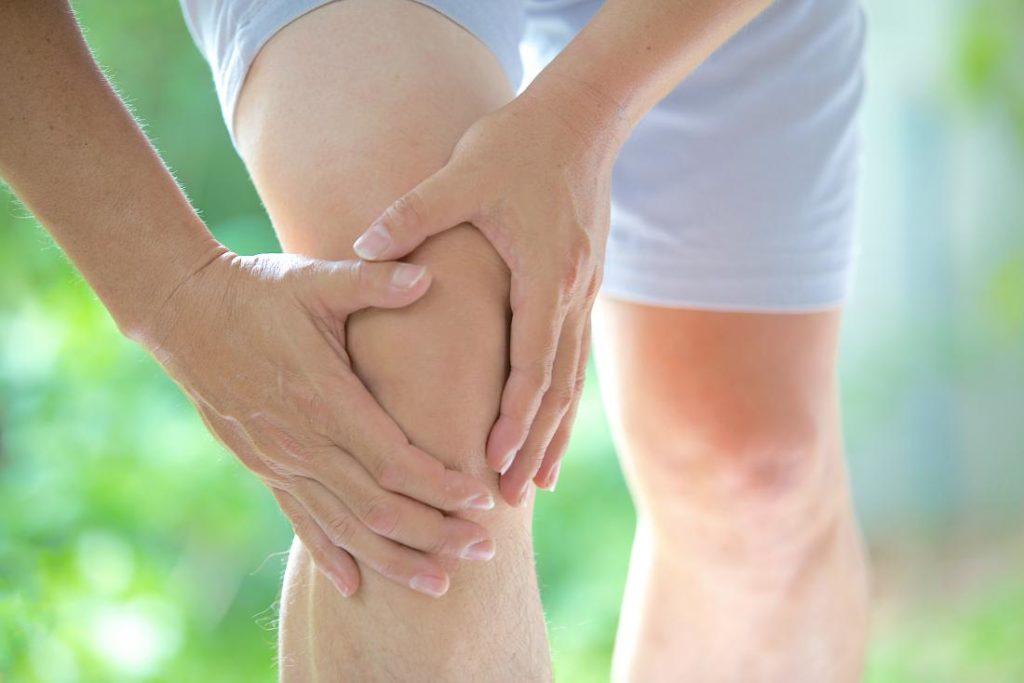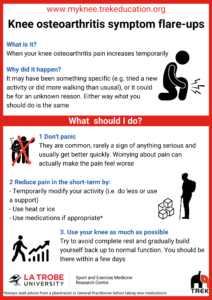A ‘flare-up’ means that you are experiencing a temporary increase in your knee osteoarthritis symptoms (for example pain or stiffness). The good news is that symptom flare-ups usually improve quickly and are not normally associated with doing any ‘damage’ to your knee joint.
This page will provide you with some general advice that may help control your symptoms.
Flare-ups of symptoms are a normal part of osteoarthritis. Luckily, these episodes are usually only short lived and nothing serious. Watch the video at the bottom of this page to understand how people with knee osteoarthritis deal with their flare-ups.
Below is an infographic that you can click on. It tells you the simple steps that you can take to manage your flare-up and assist you to return to normal functional level. However, if you would like more details than what the infographic provides, have a look at the tabs underneath it.
What do I do if my symptoms flare-up?
People can worry that they have created new ‘damage’ to their knees, however as you know from the ‘understanding the condition‘ and ‘understanding symptoms‘ pages, pain does not always equal damage.
If there has not been any recent excessive trauma to the knee then it is most likely that you have just pushed your knee movements in a different way, or slightly more than normal.
Being worried, anxious, or stressed is known to increase the amount of pain someone feels, therefore it’s really important to remain calm and optimally manage your flare up.
There are a number of ways you can try to reduce your knee pain levels.
- As mentioned in the previous section – stay calm – it is unlikely that you will have created damage to your knee.
- Try to modify your activity temporarily – for example if you have just walked to your local shops, consider stopping temporarily to rest, or consider other transport options to help you get home and reduce the amount that you have to continue to walk.
- Use heat or ice – this can be a useful way to control your pain without using medications. People often ask which is better – heat or ice? However, either heat or ice can be useful and it is a personal preference as to which is best. Regardless of which you choose, ensure that there is a barrier between the hot/cold pack and the skin and avoid heating/cooling for longer than 10 minutes every 2 hours. Also – make sure that you monitor the area that you are applying the hot/cold pack to, to ensure that you are not causing any irritation to the skin or burns.
- Consider temporarily taking pain medications that you have previously been prescribed, or visit your Doctor/Pharmacist for further advise to help you get through the flare up period. Remember that medications are the second level of the treatment pyramid and that you can move up AND down the pyramid. therefore when the pain has settled you will likely be able to reduce their intake/return to your normal levels.
- If you still need further help then you could consider seeking further help from a physiotherapist. They may be able to provide guidance specific to your situation or offer assistive devices or treatments to help control your symptoms and get you back to doing the things you were doing.
It’s important to not completely stop using your knee/leg. Consider temporarily modifying your activity to reduce symptoms.
For example if you have just walked to your local shops, consider stopping temporarily to rest, or consider other transport options to help you get home and reduce the amount that you have to continue to walk.
See if you can understand why you got a flare-up? Was it just because you used your leg much more than normal?
If so consider how you can gradually build yourself up to be able to tolerate the activity in the future by setting small progressive goals.
What do people who have knee osteoarthritis do to manage their flare-ups?
If your symptoms do not appear to be improving with any of the advice above then seek advice from your Doctor
Next – Still need further help?

